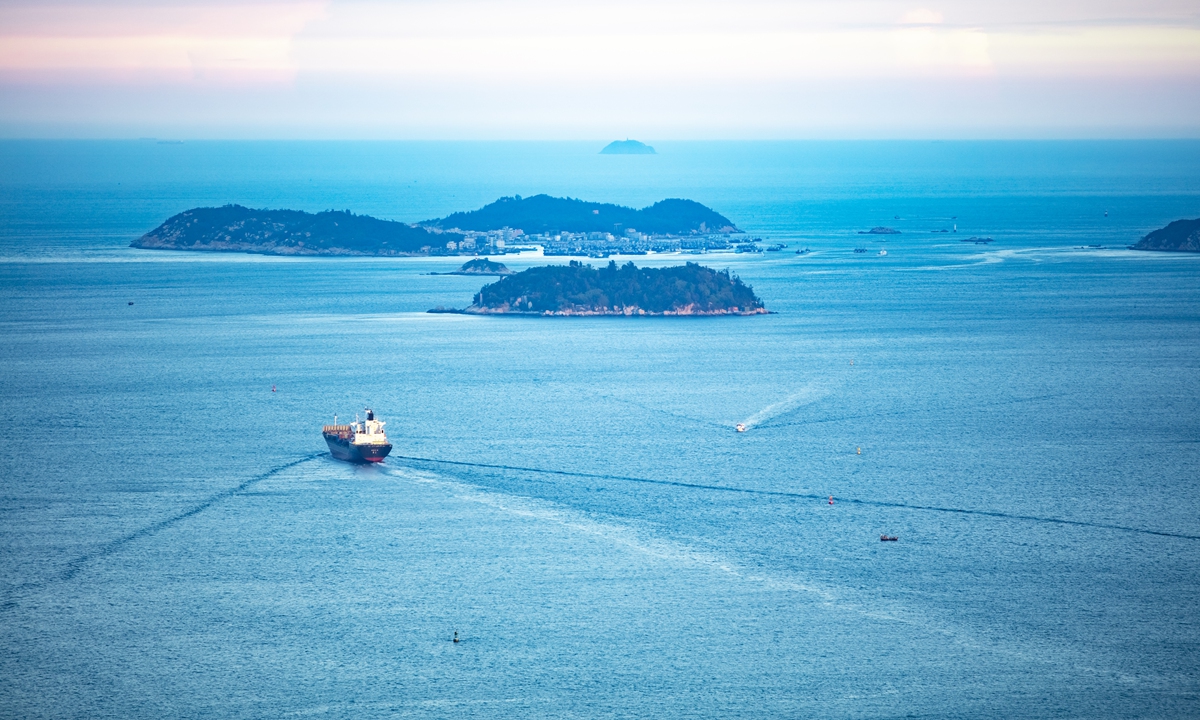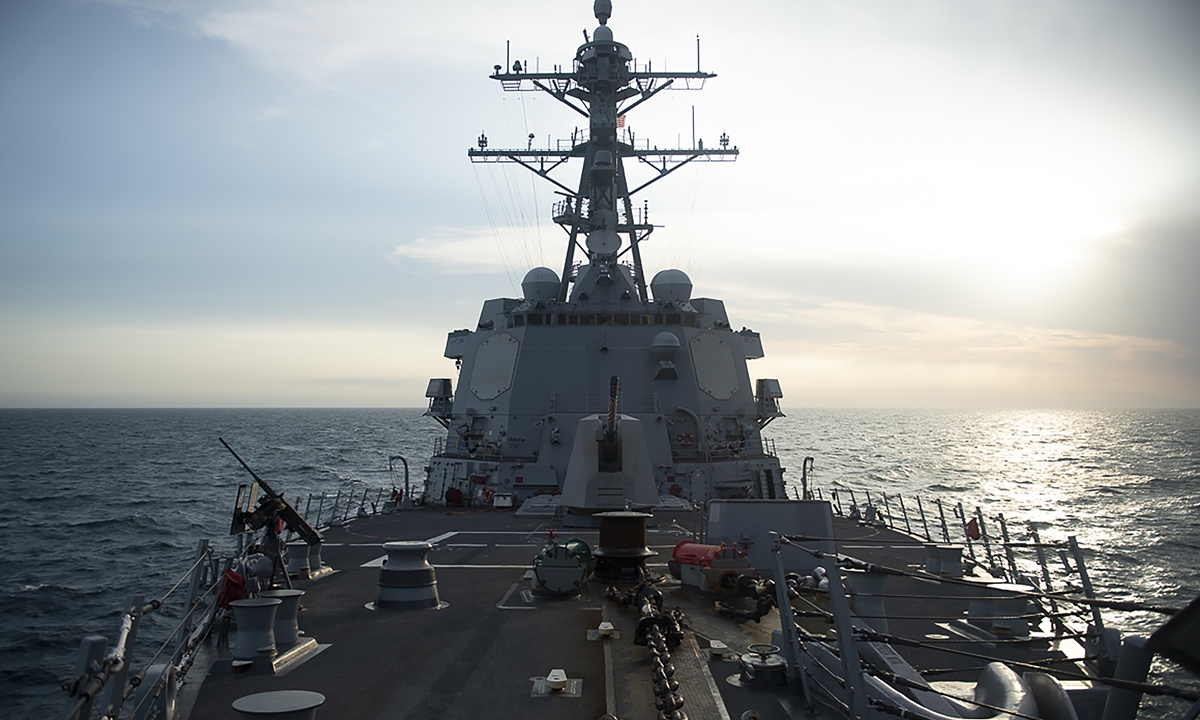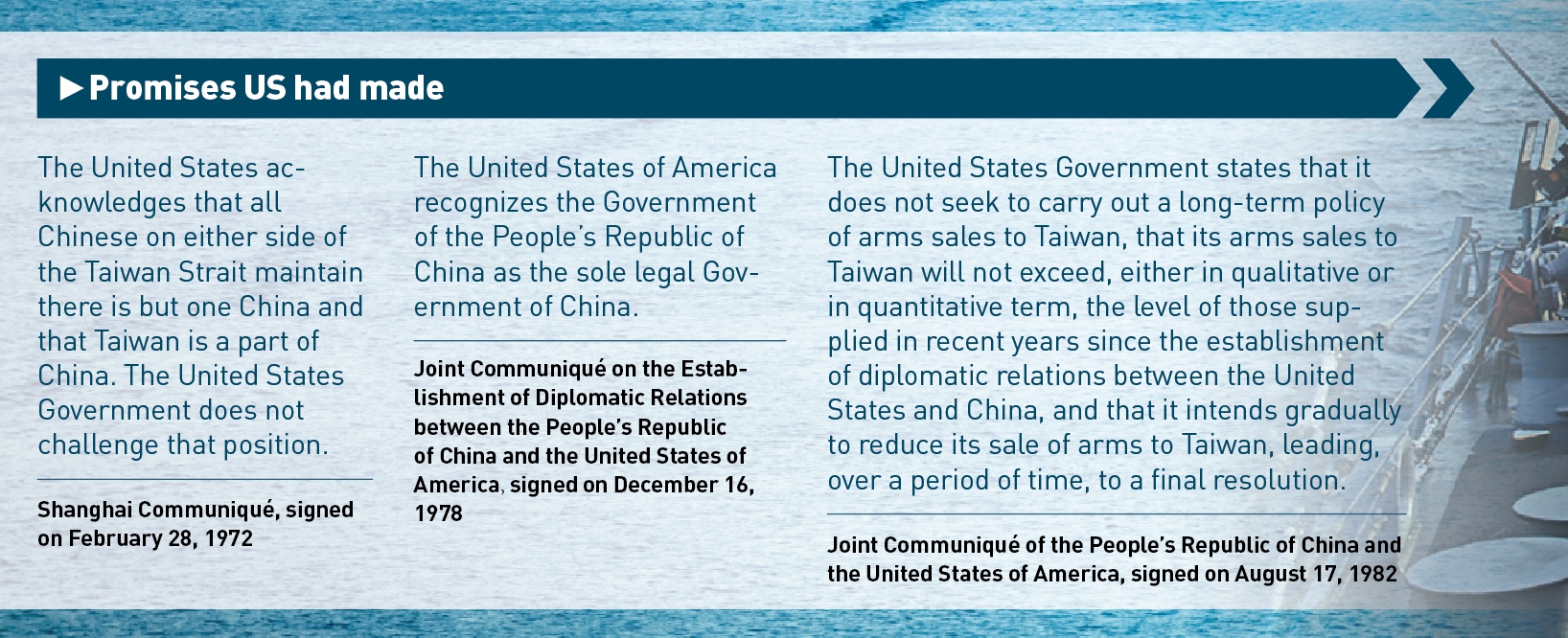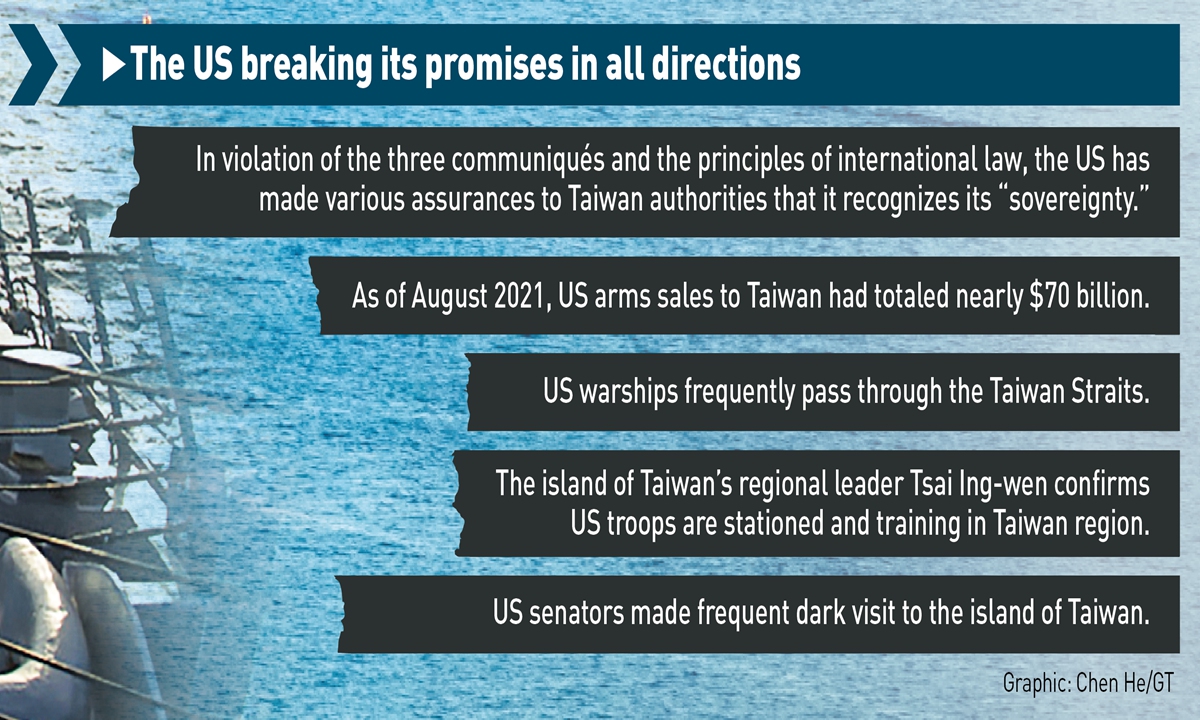Malevolent forces: How hypocritical US says one thing and does the opposite on Taiwan question?

A view of the Taiwan Straits, seen from Xiamen port, in East China's Fujian Province. Photo: IC
The US has always said one thing and done the opposite on the Taiwan question, and it has been actively engaged in a series of dirty tricks to undermine the one-China principle recently.When US President Joe Biden announced the launch of the Indo-Pacific Economic Framework for Prosperity (IPEF) in Japan on May 23, the island of Taiwan was not included in the economic initiative. On June 1, however, Washington announced a new trade initiative with the island of Taiwan. On a recent visit to Japan, Biden said the US would intervene militarily to "defend" the island. However, US Secretary of State Antony Blinken, in his speech on China policy on May 26, stated that the US does not support "Taiwan independence" and its one-China policy remains unchanged...
All of this exposes the US' hypocritical policies toward Taiwan. The US has been using the island of Taiwan as a "pawn" to implement its strategy to contain China and prevent the reunification of the country.
Nearly 40 years ago, in July 1982, Chiang Ching-kuo, former Taiwan regional leader and the eldest son of Kuomintang Chairman Chiang Kai-shek, wrote in an article in memory of his father, "I sincerely hope that my father's spirit can return home and be with our ancestors." He also said that he would "expand the spirit of filial piety into national sentiment, love the nation and devote myself to the country." On July 24,1982, Liao Chengzhi, Chiang's classmate in Moscow, wrote to Chiang, pointing out that "the outsider" is a plausible liar who intends to take the island of Taiwan, which is well known by the world. There will be chaos if you do not end relations with her, said Liao, former vice chairman of the Standing Committee of the 5th National People's Congress.
This "outsider" Liao mentioned in his letter is the US. Liao's cautionary advice unfortunately came to pass. On the Taiwan question, the outsider is now making waves, and Taiwan authorities are willing to be its puppet.
Foundation laid through tough negotiations
It was this outsider who took advantage of the Korean War in the early 1950s to insert the US Navy Seventh Fleet into the Taiwan Straits like a wedge, making the Chinese mainland and the island of Taiwan as far apart as sea and sky after the end of the Chinese civil war. During the Cold War era, the island of Taiwan gradually became part of the "island chain" strategy of the US.
In the late 1960s and early 1970s, as the international situation changed and China grew stronger, the US began to adjust its policy toward China, and China-US relations gradually gained momentum.
After a series of arduous negotiations, China and the US signed three joint communiqués, which laid the foundation for relations between the two countries and clarified positions of the two sides on the Taiwan question.
Amid major changes in the international landscape, the Taiwan question, which is to do with national reunification or secession, is bound to become China's core concern.
This year marks the 50th anniversary of former US president Richard Nixon's visit to China and the publication of the Shanghai. After a series of arduous negotiations, China and US issued the Shanghai Communiqué, which stated that the Chinese government firmly opposes any activities which aim at the creation of "one China, one Taiwan," "one China, two governments," "two Chinas," an "independent Taiwan" or advocate that "the status of Taiwan remains to be determined."The communique says the US acknowledges that all Chinese on either side of the Taiwan Strait maintain there is but one China and that Taiwan is a part of China. The United States government does not challenge that position. It reaffirms its interest in a peaceful settlement of the Taiwan question by the Chinese themselves.
In an interview the reporter had with Henry Kissinger on February 14, 2013, Kissinger said that when the US-China relationship began half a century ago, both sides had their own strategic concerns. Mao Zedong was very concerned about the growing threat from the Soviet Union, and the US was very concerned about the Cold War. Thus, there was minimal room for strategic compromise on the two sides. The US went to discuss its views of the world, and there were many similarities between the positions held by both sides. This was reflected in the Shanghai Communiqué, Kissinger said.
In the history of global diplomacy, the uniqueness of the Shanghai Communiqué is reflected in that it explicitly includes disagreements that the two sides had had as well as their common grounds. In the interim, the US and China coordinated their actions in accordance with the Shanghai Communiqué, particularly in Asia.
Under the tenure of former US president Jimmy Carter, China and the US officially established diplomatic relations. In an interview on November 10, 2013, Carter told the reporter that when he became president, he was troubled by the lack of diplomatic relations between the US and China.
"I think it's time to change that. If the US and China can work together, it will benefit the countries of the western Pacific and Asia in the future. The decision to establish ties with China was deeply unpopular in the US as the US was already allied with the island of Taiwan. I had secret negotiations with Deng Xiaoping. We started to make progress because I could feel Deng on the other side of the world decided to change China's relationship with the outside world, not just with the US," Carter said.
Strategic ambiguity
In its relations with China, the US government has always been of two minds. On the Taiwan question, only the so-called strategic ambiguity can come to a compromise, but it also fosters forces that either promote or hinder the development of bilateral relations.
Just after China and the US established diplomatic relations in 1979, the US enacted the Taiwan Relations Act to legally "regulate" its relations with the island of Taiwan. It mentioned that the US "shall provide Taiwan with arms of a defensive character." In July 1979, Carter announced the first arms sale to the island of Taiwan which was worth up to $160 million.
Three years later, China and the US signed, on August 17, 1982, the Joint Communiqué of the People's Republic of China and the United States of America, also known as the 8/17 Communiqué, which included an intended step-by-step and final settlement of the issue of US arms sales to Taiwan. The US government reiterates that it has no intention of infringing on Chinese sovereignty and territorial integrity, or interfering in China's internal affairs, or pursuing a policy of "two Chinas" or "one China, one Taiwan."
However, secretly, the US proposed in 1982 the so-called Six Assurances to Taiwan, which said it did not agree to set a date for the termination of arms sales to Taiwan and it did not agree to the revision of the Taiwan Relations Act, among others.

The guided-missile destroyer USS Sampson sailed through the Taiwan Straits on April 26, 2022. Photo:VCG
After the 9/11 attacks, the US became increasingly sensitive to China's growth. As a matter of fact, China will remain the largest developing country in the world for a long time and there still remains a huge gap between China and the US. But while China has repeatedly said that the vast Pacific Ocean is big enough to accommodate both China and the US and that China is not subversive but a contributor to the existing international order, the hegemony of the US continues to be exclusive. From Obama to Trump, a growing China has been the focus of US global strategic anxiety.The US, used to conjuring up imaginary enemies, has gradually made it clear that China is an adversary with "real strategic threats." As China is growing, and US strategic anxiety is rising. In the grand chess game of containing China, the island of Taiwan has increasingly become a pawn in the eyes of the US.
In December 2016, former US president Donald Trump had a phone call with Taiwan's regional leader. The conversation set a precedent as no US president or president-elect had ever publicly spoken with a Taiwan regional leader since the establishment of diplomatic relations between China and the US in 1979.
"I fully understand the 'one China' policy, but I don't know why we have to be bound by a 'one China' policy unless we make a deal with China having to do with other things, including trade," he told Fox in December 2016. Later, after strong pressure from China, Trump changed his tone, saying that he honors the one-China policy.
While ostensibly sticking to the one-China policy, the Trump administration repeatedly crossed the red lines. On the afternoon of August 9, 2020, US secretary of health and human services Alex Azar arrived in Taipei for a visit. During the Trump presidency, arms were sold to the island of Taiwan 11 times, which were far more than the total amount during Obama's eight years in office. The Trump administration sold nearly $20 billion worth of arms to Taiwan. In August 2019, Trump approved a major $8 billion arms sales to the island of Taiwan involving 66 new F-16C/D fighter jets, the largest single US arms deal to the island of Taiwan to date.
Former US secretary of state Mike Pompeo once planned to visit the island of Taiwan when he was in office. Although he did not make it when he was in office, after stepping down, Pompeo finally visited the island of Taiwan in March 2022 to show his support to the Taiwan secessionists.
Dirty tricks
The Biden administration has reevaluated China-US relations. On July 6, 2021, Kurt Campbell, deputy assistant to the president and coordinator for Indo-Pacific affairs on the National Security Council, publicly said the US does not support "Taiwan independence." In September 2021, Biden said the US does not seek a new Cold War in a UN speech. He reiterated this during a video conversation with top Chinese leadership on March 18, 2022. Other top US diplomats also made similar statements on different occasions.
However, the Biden administration does not behave as it has publicly claimed. The hypocrisy and two-sided nature of America's China policy is accompanied by an increasingly alarming crossing of red lines. Many US politicians have staged anti-China performances.
With the continuous influx of American equipment into the island of Taiwan, long-term US military-industry complex profiteering tactics can clearly be seen. In April, during his visit to the island of Taiwan, US Senator Lindsey Graham made no secret of his request for the island to buy Boeing aircrafts, which is related to his constituency. What the US is doing reflects its deep-rooted strategic anxiety toward a growing China. While it claimed that it does not seek a Cold War, the Biden administration still treats China as a threat to its global hegemony. The island of Taiwan has now become the pawn of the US.
As a pawn, Taiwan may also be abandoned. Trump once said that the island of Taiwan is like the "nib" of a pencil.

Graphic: GT

Graphic: GT
Like his predecessors, Biden will maintain a tough stance on China while facing midterm elections. Although the Biden administration is clearly aware of the bottom lines, it never gives up its attempt to challenge them.In response to this US strategy, China issued stern warnings. Chinese Foreign Ministry spokesperson Zhao Lijian said on May 31 that "We urge relevant US politicians to earnestly abide by the one-China principle and the three China-US joint communiques, and immediately stop official exchanges with Taiwan in any form and refrain from sending any wrong signals to 'Taiwan independence' separatist forces. China will continue to take forceful measures to resolutely safeguard China's sovereignty and territorial integrity."
Wu Qian, spokesperson for the Ministry of National Defense, said, "The Chinese People's Liberation Army has always been capable of and determined in safeguarding national sovereignty and territorial integrity, as well as defeating separatist forces seeking 'Taiwan independence' in any form."




Nessun commento:
Posta un commento